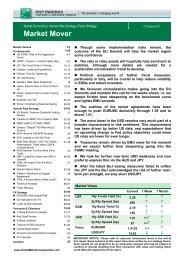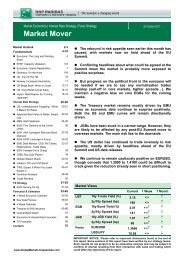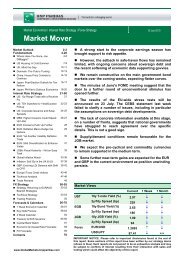Market Outlook - BNP PARIBAS - Investment Services India
Market Outlook - BNP PARIBAS - Investment Services India
Market Outlook - BNP PARIBAS - Investment Services India
You also want an ePaper? Increase the reach of your titles
YUMPU automatically turns print PDFs into web optimized ePapers that Google loves.
The subtle changes in the wording of the<br />
statement include a more confident belief that<br />
consumption growth is accelerating, inventories<br />
are under control and economic activity is<br />
strengthening<br />
One of the most prominent of these text changes has<br />
to do with household spending. In December the<br />
FOMC stated, “Household spending appears to be<br />
expanding at a moderate rate” whereas, in January,<br />
the FOMC believe that “Household spending is<br />
expanding at a moderate rate”. Another, not so<br />
subtle, change in view concerns the inventory<br />
correction. In December the FOMC wrote that, “Firms<br />
continue to make progress in bringing inventory<br />
stocks into better alignment with sales” whereas now<br />
they believe that “Firms have brought inventory<br />
stocks into better alignment with sales”. As a result,<br />
the FOMC now thinks that, “Information received<br />
since the Federal Open <strong>Market</strong> Committee met in<br />
December suggests that economic activity has<br />
continued to strengthen”. In contrast, in December,<br />
the FOMC wrote that, “Information received since the<br />
Federal Open <strong>Market</strong> Committee met in November<br />
suggests that economic activity has continued to pick<br />
up”.<br />
The FOMC removed all references to the housing<br />
sector, despite the disappointing flow of data<br />
The most significant window into the FOMC’s<br />
thinking is that it removed any reference to the<br />
housing sector. In December it was concerned about<br />
this sector’s recovery and wrote: “The housing sector<br />
has shown some signs of improvement over recent<br />
months”. Since then, all the news on the housing<br />
sector has been extremely disappointing. In<br />
December, new and existing home sales crashed<br />
7.6% and 16.7% m/m respectively and housing starts<br />
fell 4%. All were well below the consensus forecasts.<br />
Thus, the depressing housing data must have also<br />
surprised the FOMC members and yet they chose to<br />
avoid any reference to this disturbing reversal of the<br />
housing market’s recovery.<br />
The FOMC apparently did not want to disrupt its<br />
plan to end its purchases of mortgage-backed<br />
securities by 31 March<br />
The lack of reference to the housing market’s<br />
reversal is an important omission in light of its goal to<br />
stop purchasing agency issues and agency<br />
mortgage-backed securities by the end of March.<br />
Despite the very obvious deterioration in the housing<br />
sector’s recovery, the FOMC remains adamant that it<br />
will end its support of the mortgage market. We had<br />
previously thought that, given the reversal of the<br />
recovery in the housing sector, the FOMC would<br />
make the end of purchases more conditional on the<br />
housing sector’s recovery. Clearly the FOMC was not<br />
as concerned about the dependence of the housing<br />
Chart 3: The Liquidity Initiatives are Winding<br />
Down<br />
Source: Reuters EcoWin Pro<br />
Chart 4: Time for a Rise in the Discount Rate<br />
Source: Reuters EcoWin Pro<br />
sector’s recovery on its mortgage market support.<br />
The FOMC will therefore purchase an additional<br />
USD 279bn of agency mortgage-backed securities<br />
between now and 31 March, which will continue to<br />
enlarge its balance sheet.<br />
The FOMC was also slightly less emphatic that<br />
inflation will be subdued for some time<br />
There were also two subtle changes to the brief<br />
remarks on inflation from the previous policy<br />
statement. First, the FOMC substituted the term<br />
“restrain” for “dampen” in their statement that, “With<br />
substantial resource slack continuing to restrain cost<br />
pressures and with longer-term inflation expectations<br />
stable, inflation is likely to be subdued for some<br />
time”. The nuance here is that dampen means to<br />
deaden or depress while restrain means to hold<br />
back. This is a significant difference in meaning. The<br />
second tiny nuance was that they currently believe<br />
that inflation is “likely” to be subdued instead of “will<br />
remain” subdued for some time.<br />
Brian Fabbri 29 January 2010<br />
<strong>Market</strong> Mover<br />
5<br />
www.Global<strong>Market</strong>s.bnpparibas.com
















